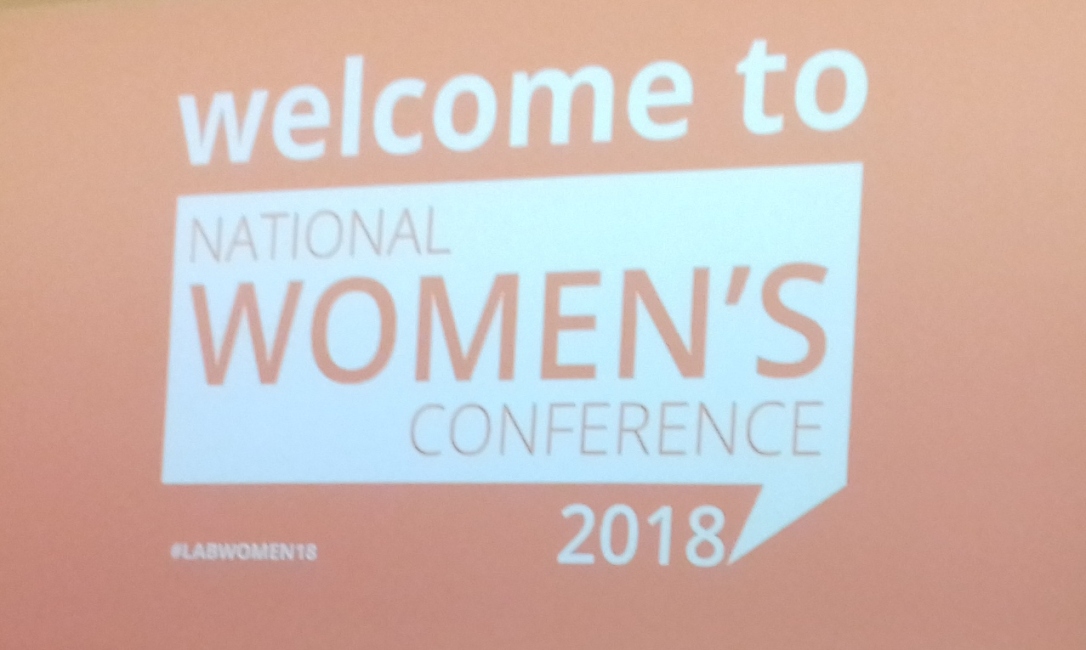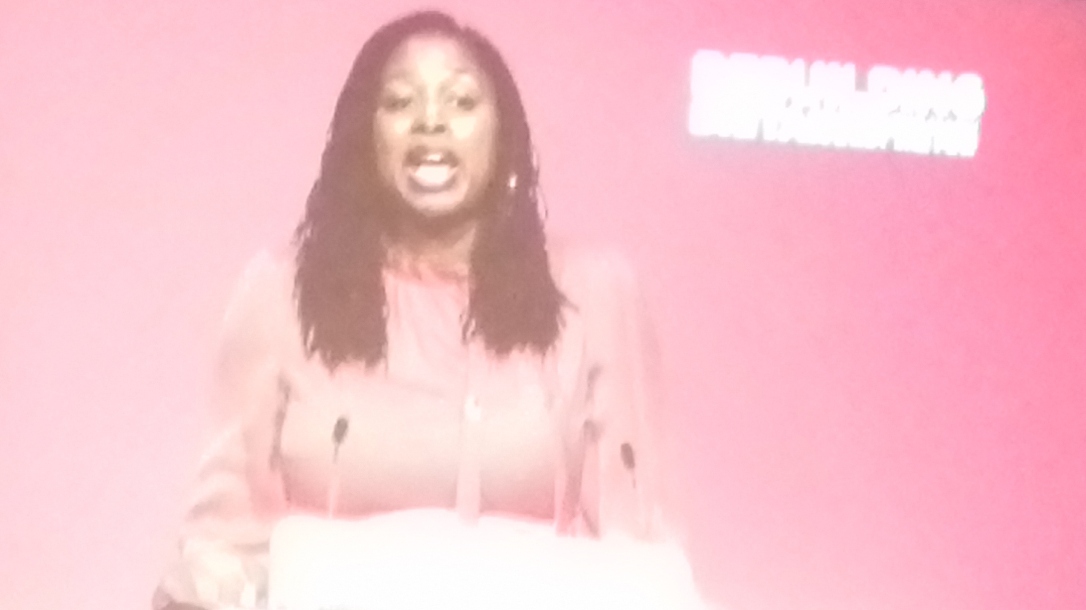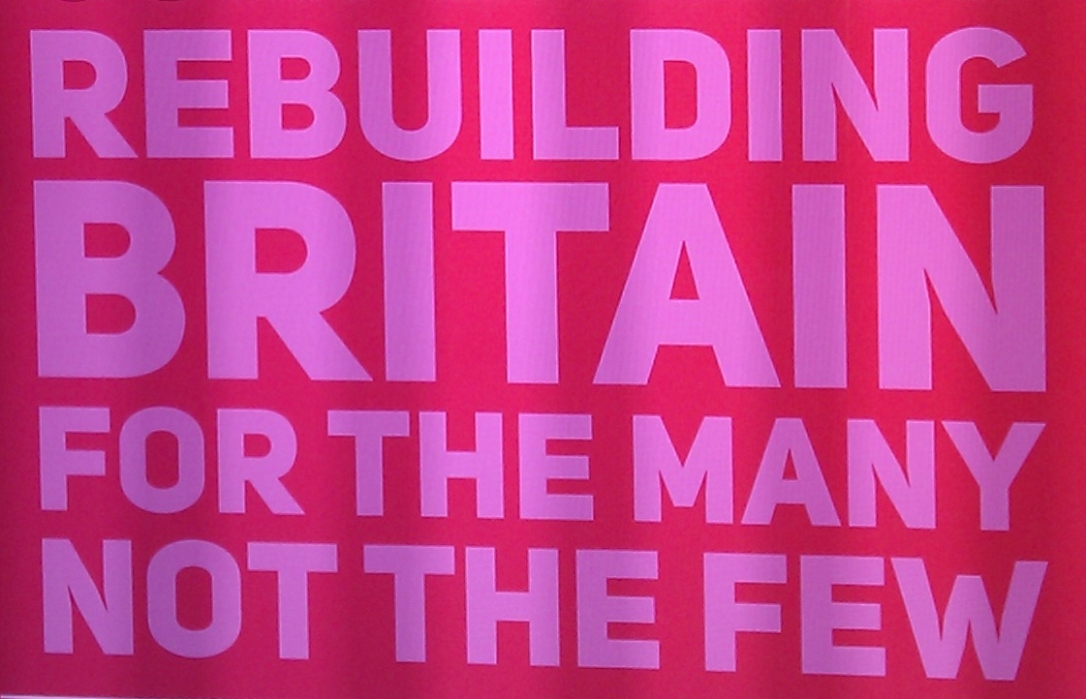NATIONAL WOMEN’S CONFERENCE 22.9.2018
Jill Spedding reports from Liverpool…
This was my first time as a delegate and my first conference and it was an interesting experience. It was also quite demanding to have to get to grips with all the reports and procedures and take notes.
SUMMARY
To introduce the morning session there were three speakers:
-
Jennie Formby – General Secretary of the Labour Party
-
Dawn Butler – Shadow Minister for Women and Equalities
-
Jeremy Corbyn – Leader of the Labour Party
This was followed by the discussion of the four motions that were successful in the Priorities Ballot, these were then debated and at the end of the day the vote was taken on which of these four go on to Annual Conference. The result of that vote was:
-
Women in the Economy 49.85%
-
Childcare 12.71%
-
Abortion 16.00%
-
Women’s Health and Safety A 17.06%
-
Women’s Health and Safety B 4.38%
Therefore Women in the economy was taken forward to Annual Conference.

SPEAKERS
Jennie Formby
Next February we will have a stand alone Women’s Conference in Telford.
Dawn Butler

Dawn started with “We are the many! There are 51% of us”.
She then moved on to talk about the Conservative Govt. creating an hostile environment for people of the Windrush generation, the disabled, LGBT+, older people and BAME people. Other points she made were:
-
86% of the cuts have affected women.
-
We need a govt. to provide innovation and transformation to help working people and those that need a govt that cares.
-
Women are badly paid due to gender gap or unpaid caring responsibilities.
-
Local councils budgets have been cut by nearly 50% creating a crisis in women’s refuges, foodbanks and period poverty.
-
Even in opposition we’ve had victories; scrapping employment tribunal fees and universal credit waiting times reduced.
-
Labour will create a new dept with a Secretary of State to reduce discrimination and inequality
-
1.2m women a year suffer from domestic violence (DV) and the impact is devastating. Labour will require employers to have a Domestic Abuse Policy and allow up to 10 days per year paid leave – giving victims crucial time to get help and find safety.
-
Intersectionality – different types of discrimination can be suffered at the same time – a woman can be discriminated against both because she is black and because she is a woman or age and gender or disability and gender. Labour will enact section 14 of the equality act to enable cases of multiple grounds of discrimination.
Jeremy Corbyn
Jeremy made the following points:
-
There are more women in the Labour Party than total members in the Conservative Party and the Lib Dems combined.
-
Teresa May is unconcerned about the rights of women and created a hostile environment for the poor as well as the Windrush generation.
-
Her government has transferred money from women to the rich men.
-
We need a carers charter so that people don’t have to beg and borrow the items necessary to enable care to happen.
-
UK is 17th out of 28 countries for women’s life expectancy.
-
There’s a need to deal with the gender pay gap as highlighted by the BBC and the issue of sexual harassment shown up by the #Metoo campaign.
-
A square in Brussels is to be named in honour of Jo Cox
-
We must recognise human rights defenders all around the world and have a human rights led foreign policy
-
Tories talk about equalities but the lived experience of people is different and when in government Labour will measure it’s success on the improvement in equality.

POLICY DISCUSSIONS
Women in the Economy
Women spoke about:
-
the need to scrap universal benefits
-
Need to recalibrate what successful women look like, look at what women achieved during the war and rebalance values as well as the value attached to the work women do; cleaning and caring.
-
Women with disabilities find it very hard to get jobs and survive in our economy.
-
In 1978 the first women train driver was appointed with no gender pay gap but there are few BAME applicants then or now. When we renationalise the railways we need to ensure that one of it’s aims is to diversify the work force.
-
The WASPI women have lost an average of £50k in pensions payments and this needs to be addressed.
The motion calls upon Conference to:
-
campaign for a fair social security system.
-
Reversing cuts to work allowances
-
Repeal two child limit.
-
Reforms to Universal Credit
-
Support for low income households housing costs.
-
Building 100,000 social rent homes a year.
Childcare
Women spoke about:
-
50k working women lose their jobs during their pregnancies.
-
Only 2% of male parental leave is taken up.
-
Childcare is not a women’s issue it’s an infrastructure issue, when the Labour Party gets as incensed about it as it does about nationalising rail then things will happen.
-
One woman told how her local Sure Start centre provided support for her, her children and her family and saved her life. We must value them and other early years services.
-
Lack of pre and after school places in many areas, their must be consistency of care across the country.
-
Employers need to provide leave for parents when children are sick.
The motion calls on Conference to to commit to giving children the best start in life by ensuring the highest standards and equality, health and well being with the following policies:
-
Public nurseries and Early Years Services.
-
Work with Trade Unions to challenge maternity leave discrimination.
-
Develop a robust parental leave and pay policy which reduces women’s economic and domestic disadvantage.
-
Call on all councils to introduce childcare and parental leave policies for councillors.
Abortion
A lot of the discussion was around the need to decriminalise abortion by repealing ss. 58 and 59 of the Offences Against the Person Act 1861. The 1967 Abortion Act does not decriminalise but permits abortion in licensed medical premises and two doctors agree. In Northern Ireland the 1967 Act does not apply and abortion remains illegal with very few exceptions.
Women spoke about:
-
The many healthcare professional bodies that agree with decriminalisation.
-
Control over our bodies is essential to the freedom of women.
-
There are many reasons why women do not want to go to their doctors to get abortions; illegal refugees, domestic violence, partners or families finding out.
We call on conference to:
-
Provide free, safe, legal abortions on the NHS in Nothern Ireland.
-
Support Stella Creasy MP in repealing ss. 58 and 59.
-
increase close to home abortion care by providing in-clinic care, specialist staff and advice and after care support, such as counselling.
-
Include decriminalisation in the manifesto.
If this fails we call on Labour to support efforts to make free, legal and safe abortions available in NI as soon as possible.
Women’s Health and Safety (1 of 2)
This motion covered period poverty and menopause issues. Women spoke about:
-
Menopause is an issue at work as well as in other areas of our lives.
-
PP has worse effects on people with disabilities and mental health issues.
-
It’s acerbated by the gender pay gap.
-
PP can mean women missing work and girls missing school leading to more lost opportunities.
-
Menopause issues at work make you feel like you’ve just gone from “high heels to fluffy slippers”
We call on conference to commit to a system of free sanitary products for period and incontinence and recognise that Menopause can have a debilitating effect on workers lives. Conference resolves to legislate to give menopausal workers similar protections to pregnant workers and for absence due to menopause not to be used in capabillity assessments.
Women’s Health and Safety (2 of 2)
This motion covered violence against women in the world of work. Women spoke about;
-
How high profile women have spoken out about violence and harassment but not so much is known or heard of the day to day lives of the majority of women who suffer but don’t have access to the media.
-
Services for children, who are also victims of DV are poor.
-
Prostitutes and street workers also suffer violence and abuse.
-
We need 10 days leave DV victims.
-
Sexual harassment is still prevalent in the work place.
-
“It’s just a joke, a bit of banter” well it’s not and needs to be called out.
-
Employers must take it seriously.
-
Funding for women’s refuges closer to home to enable them to keep their links with families, friends and support networks.
We call on conference to:
-
enable the gathering of reliable prevalence data on DV in the UK.
-
Applying the ILO Convention on ‘ending violence and harassment against women and men in the world of work’ to national law and ensuring the definition of violence includes DV.
-
Ensuring specialist services for women and children escaping DV are fully resourced including for refuges.
Jill Spedding
Women’s Conference Delegate 2018
Brighton Pavilion CLP

